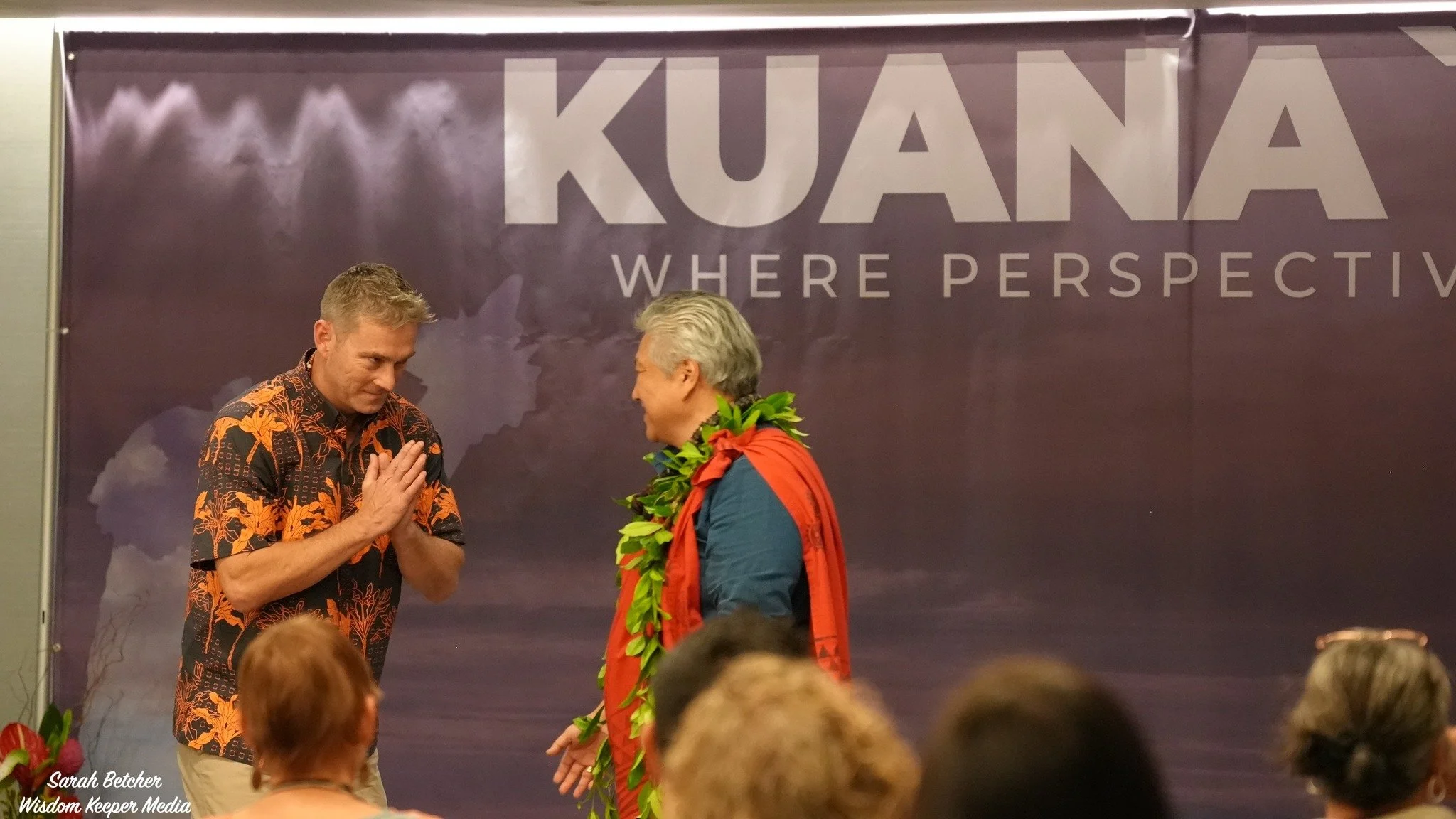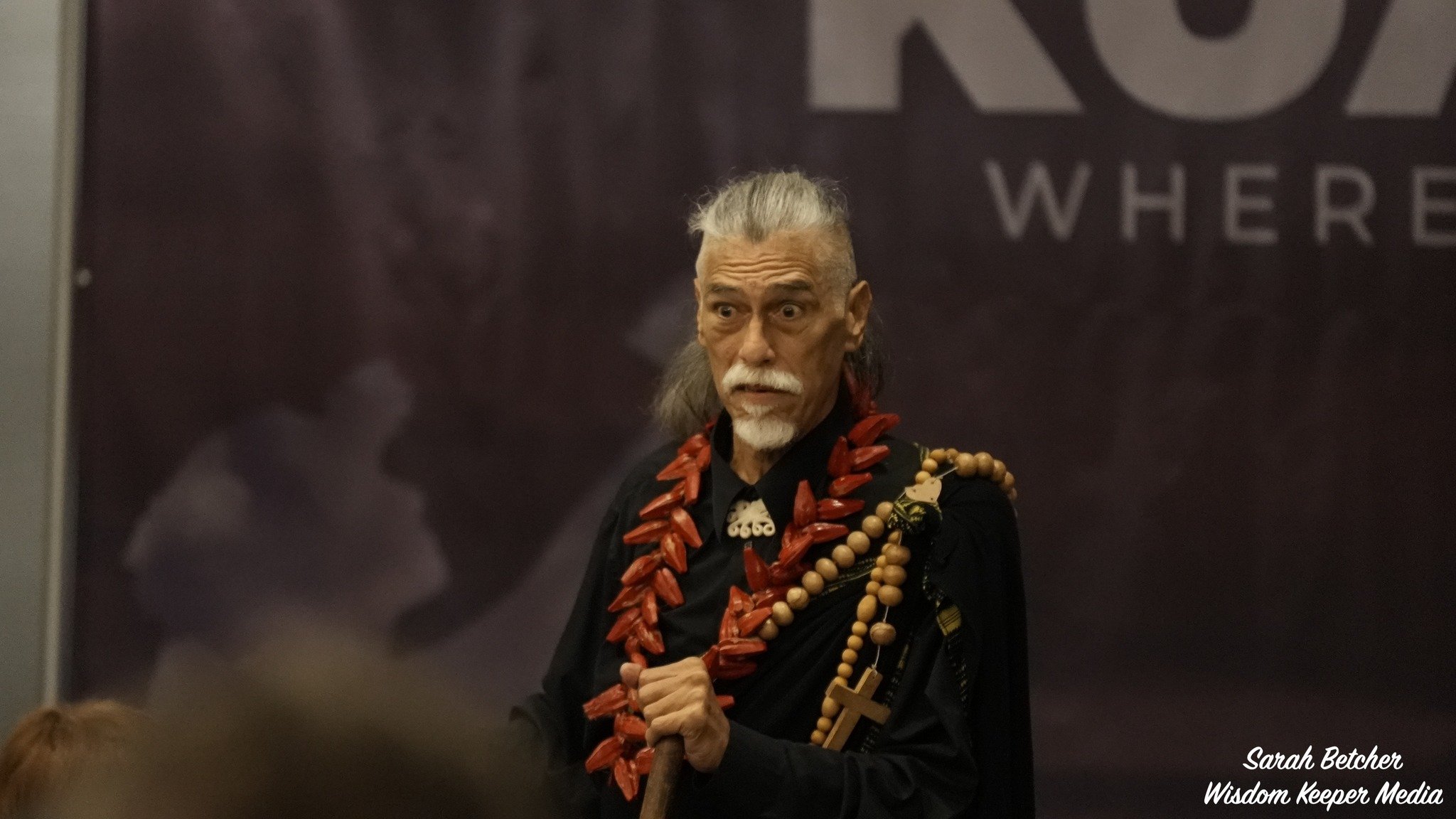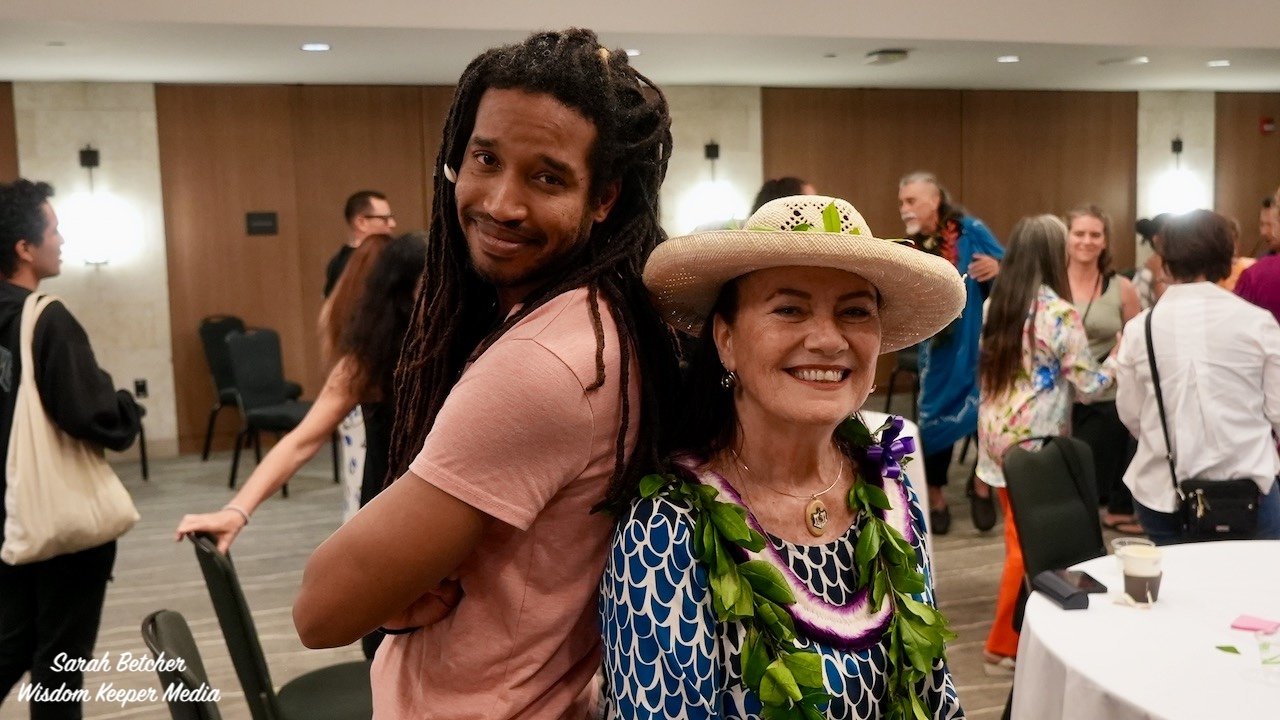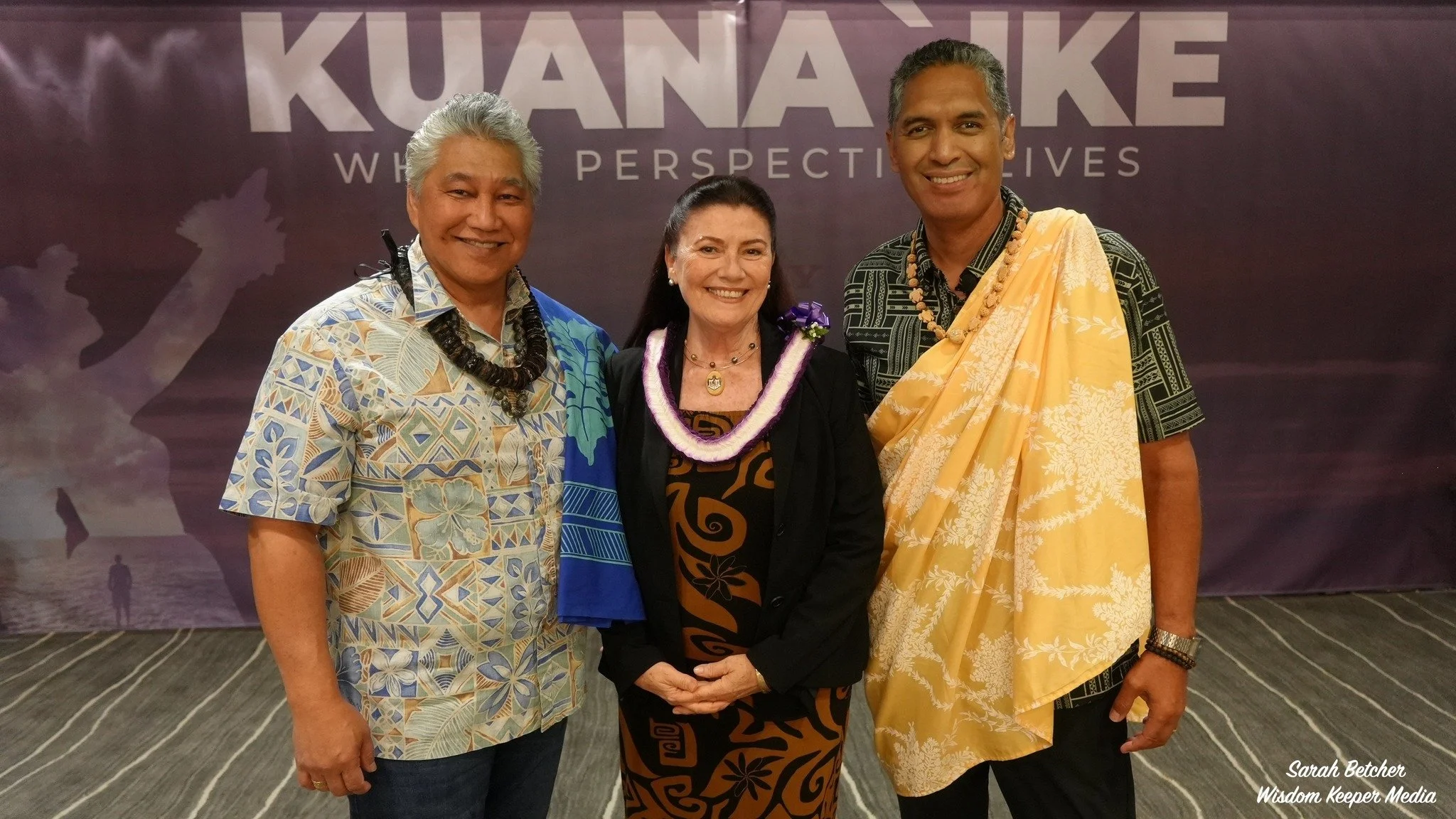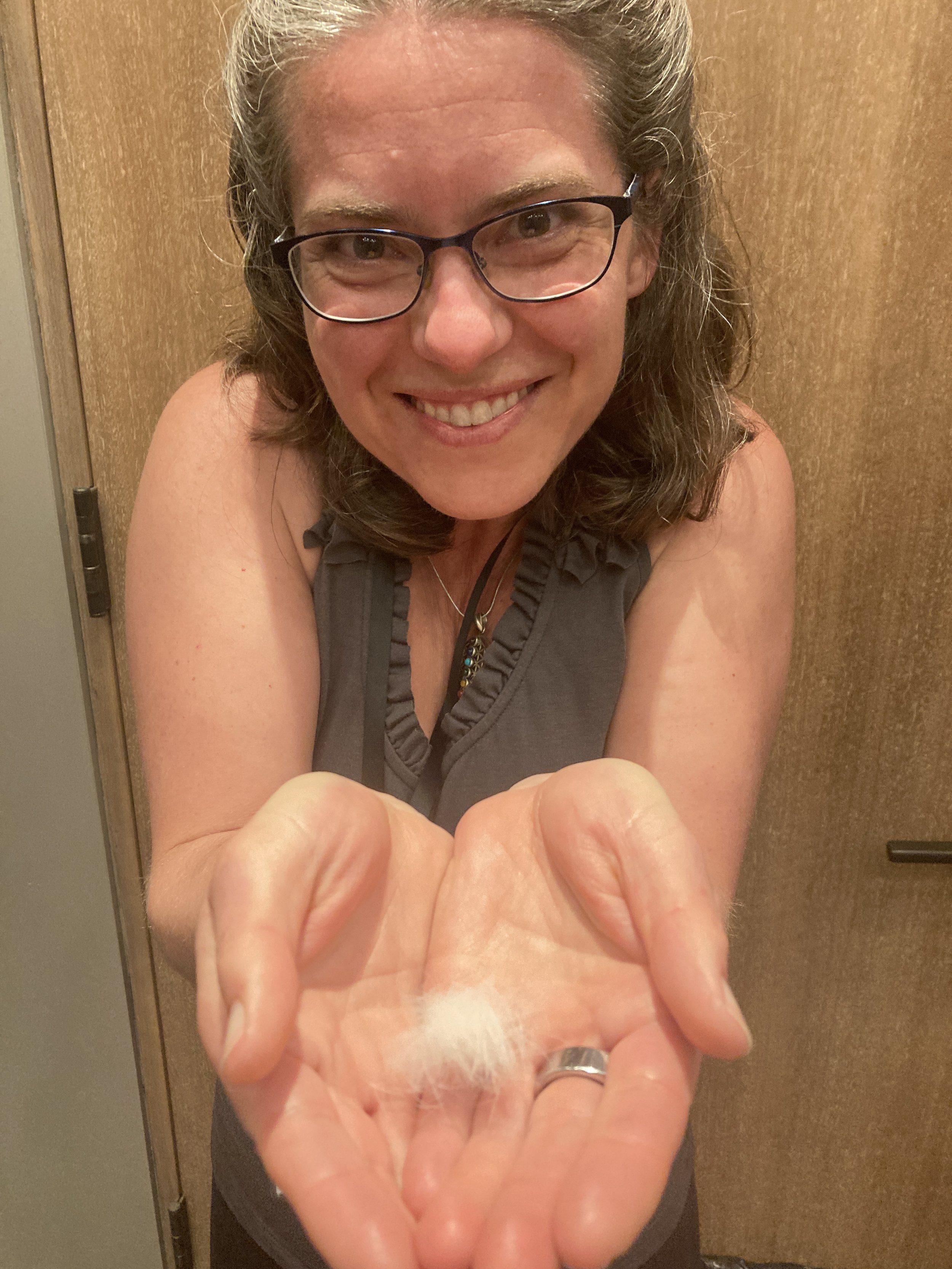Spirit Fest 2024 (photo credit: Sarah Betcher, Wisdom Keeper Media)
I’m realizing it’s going to be hard to capture the last week in words, but here goes… (And I’ll feature my sister Sarah’s beautiful photos from the event to make up for the words I don’t have!)
When I arrived in Hawaii two week ago, I didn’t know I’d be attending Spirit Fest, but as several people there told me with a wink or a twinkle in their eyes, I was right where I needed to be. I’d booked my flight from San Francisco to Maui and my flight from Honolulu to Tokyo, knowing I’d need to get from Maui to O’ahu at some point. Coordinating with my sister Sarah before I arrived at her place she told me she was headed to an event in Honolulu called Spirit Fest, which she would be filming through Farthest North Films & Wisdom Keeper Media. She knew she’d be busy with the event so we wouldn’t be able to hang out much while we were in Honolulu, but at least I’d be able to help her transport her gear. So she suggested I book the same flight from Kahualui to Honolulu and I did. It was a few days before the event that Cambria, the event logistics coordinator, mentioned they could use one more volunteer. Sarah checked in to see if I was interested. I said I was, that I’d love to be helpful, to be part of something. So glad I was!
Glad I could help play assistant grip for my sister Sarah as she schlepped her videography equipment!
We bid Maui farewell on Thursday morning and arrived in Honolulu where we were picked up by J.R., the founder of Kuane’ike, the organization that hosts Spirit Fest. It was clear immediately that he was the visionary everyone had said he was, but also someone who is big-hearted, grateful, and who quickly gives credit where it’s due, while marveling at synergies. He got us to the hotel where Sarah and I got her gear to the event space. I jumped into helping with event set up while she got her equipment set up. J.R. was coordinating with his wife Michelle on the phone and he ended every quick call with “Thank you. I love you.” “Yup, this is the sort of person you want kick-starting an event,” I thought.
J.R. Moorhead & Kumu Ramsay Taum (photo credit: Sarah Betcher, Wisdom Keeper Media)
Shortly after Michelle arrived and showed us what she was imagining with the flower arrangement. Tristan and I did our best to make it happen. Working with these beautiful Hawaiian flowers, I found myself flashing back to the day before last year’s Vermont Lu’au when Maile received a long skinny box from a friend of hers from Hawaii. As she unwrapped it, we cried at the beauty of both the flowers and the gesture. They were improbable in Vermont, these lush tropical flowers against the backdrop of sugar maples. Here in O’ahu they were no less exquisite, but they belonged.
What fun to arrange tropical flowers for Sprit Fest 2024!
I enjoyed meeting the rest of the event team as they arrived. I was delighted to be so quickly and warmly welcomed in with hugs and air kisses. One of the first people to arrive was Kumu Kalani, a Hawaiian elder who has died (or nearly so) multiple times and no longer fears it, believing he’s still here because he still has a purpose for being here. He began sharing insights while we waited for the hotel check in process to wrap up. We were discussing event prep and he said there are three questions to ask if you’re responsible for a gathering: 1) Are the children fed? (Because if the children are hungry they cannot focus, learn, or play), 2) Are the elders comfortable? (Not just accommodated, but actually comfortable?) and 3) Are the women unafraid? (Because if they are scared they cannot be fully present and if they are fully present it’s all going to work out. So what do we need to do to ensure there is no fear in their eyes?) “So this is how it’s going to be…” I found myself thinking. Open mind, open heart. I started jotting bits of wisdom right away. I knew my heart could hold it, but I wanted to be sure my mind could remember, too.
Kumu Kalani (photo credit: Sarah Betcher, Wisdom Keeper Media)
Friday morning I was pleased to be at the registration table with Michelle and Tristan because it meant I got to greet people as they arrived. People were clearly glad to be there. They seemed inspired already. (By the way, one of my learnings from the event is that the etymology of “inspire” is to “breathe in” so we’re breathing in and soaking up when we’re inspired!) The event started with oli, songs sung by the elders.
The energy in the room was impressive from the first session, facilitated by Johnelle Madera. The first day was about healing and it was healing. After hearing from Kumu Hina we visited the Healing Stones across the street from the hotel on Waikiki Beach and heard about their history. At the end of the day we went down to the ocean as Mark Kunimune and Kēhaulani Kupihea guided us in a cleansing ceremony.
Kumu Hina (photo credit: Sarah Betcher, Wisdom Keeper Media)
Saturday was about connection and it was fun to both witness and experience connections. There was a focus on connecting to our ancestors and their wisdom, to our land (including the air and sea), and to each other. As I heard Hawaiian elders speak of connection to ancestry and place, I felt a nagging sensation and I couldn’t place it at first, so I let it simmer in the background as I focused on the third part of connection to each other. That part is easy enough for me.
Making connections through the game Graticube (photo credit: Sarah Betcher, Wisdom Keeper Media)
I’m perpetually on the lookout for small world moments, those serendipitous discoveries of commonality. When they’re plentiful, I feel like I’m on the right path. I had a couple of my own that day, like realizing Kenny and I are going to be in Tokyo at the same time and figuring out that Rob and Tristan live in the Tri-Ciities, just an hour from my place in Walla Walla where I spent the past couple of months. When I told our team I was collecting small world moments, they started telling me about theirs during the breaks or slipping me pages of paper from the hotel note pads with small world moments jotted on them. Cambria and Paris have the same birthday and grew up in the same town. Nate had started following Rob on social media because he liked his message, completely unaware he’d be at this event and they’d have the chance to talk in real life. And on and on.
Paris & Princess Owana Salazar (photo credit: Sarah Betcher, Wisdom Keeper Media)
Partway through the day Ashlee DiSalvo lead us in a visualization. The second part of it was imagining who we could turn to for guidance as we navigate our lives. My grandfather and his mother, my great grandmother came to mind for me. This seemed odd, considering that Grandpa Pete passed when I was just 15 and I didn’t know him well. I could probably count on two hands the number of times I saw him. But I have always adored him. I have fond memories of his stories and his hugs. He was a sturdy man, short and stocky, and I loved his laugh. He was mischievous and kind. I loved the short period of time we wrote letters back and forth in French when I was studying it in middle school.
Somehow in the family lore I had come to believe my grandpa moved to America from France when he was 3 years old. When I reconnected with my aunt, my dad’s sister, just a couple of year ago she told me that wasn’t true. She said he had grown up somewhere in Massachusetts or Connecticut before moving to Washington state as a young man. When I did some genealogical research I discovered he had grown up in Uxbridge, MA, less than 2 hours from Brattleboro, VT. This amazed me since I’d also gone to school in Walla Walla, just an hour from where my dad grew up, not knowing that either. I never met Grandpa Pete’s mother, my great-grandmother Lola Lescault Menard. She died in the flu epidemic of 1812, leaving behind two little boys, my grandpa and his little brother. I have just one black and white photo of her, a beautiful young woman in a white dress, tied with a big bow, playing the violin. I went searching for her grave this past fall in Uxbridge, Massachusetts and wasn’t able to find it. The intensity of the sadness had surprised me. I’d been curious about genealogy, but I’d never been one to go looking for gravestones.
Kumu Ramsay Taum, Princess Owana Salazar, Ryan Souza (photo credit: Sarah Betcher, Wisdom Keeper Media)
Towards the end of Saturday, Lei’ohu Ryder spoke to the group and I was amazed at how carefully she had been listening to everyone. She connected threads from so many people’s stories, weaving them throughout her talk. By the end of the evening, as she was taking questions, I was still attempting to formulate my own. It was something like this: “Colonialism has created such atrocities - slavery, kidnapping, forced assimilation, rape, torture, displacement, genocide, and more - which have separated people from each other, from their history, and from their land. This has had horrific impacts on the people who have survived colonization. And it has impacted white people, too. As a descendant of colonial empires - French, English, German - I grew up with the privileges of whiteness. My skin color has been considered normative despite it being less common than brownness and blackness. And yet, I, too, am displaced and disconnected. I don’t have a strong connection to my ancestors or to a homeland. I adore my aunties and I’m grateful for their stories, but they only remember so much because their parents didn’t talk about the past. I did not grow up at the knee of a tutu who taught me the ways of my people and place. I don’t have a land-based set of wisdom to draw on. So how do I begin to heal that for myself? Listening, clearly, is one answer. Listening to the wisdom of people who do still have a connection to their people and their place. I am doing this. I will continue to do this. But what else?”
Maydeen ‘Iao & Lei’ohu Ryder (photo credit: Sarah Betcher, Wisdom Keeper Media)
As the day wrapped up I went up to thank Lei’ohu, still not quite sure what I was going to say. So I started with “thank you.” She glanced at my name tag. “How do I say your name?” she asked. “Lina,” I told her, using my typical pneumonic, “It’s like Linda without the D.” She nodded and nudged “and your last name?” “Menard,” I said. “But in French, ‘Lina Menard,” saying it this time with a French accent. She nodded again. And I burst into tears. Her partner, Maydeen ‘Iao, who had given me a big hug the day before had turned her attention to us now, too. They waited while I collected myself and fumbled through the question I’d been mulling over. “And then you greet me with my grandfather’s name…” I said. “So in that you’ve already started to answer my question.” Lei’ohu smiled wisely. “I tried to find my people’s graves,” I blurted out, “and I couldn’t.” She nodded again and looked deep into my eyes. “That’s okay,” she assured me. “You don’t need to find their graves. They are here with you regardless.” She tapped my heart with a finger. I nodded and hugged her and Maydeen again. We talked some more and then it was time to go.
I’ve been thinking a lot in recent years about intergenerational trauma, story, history, and healing. I don’t write about these topics much here. Those thoughts are usually sandwiched within the pages of my journals. Mostly because it’s not about designing and building. Right?! But it is about home. And home is as much at the heart of my work as houses are. So I have decided to share my experience from Spirit Fest here because in many ways, My Trip Around the World is about going deeper, about braving up, about listening, about sharing. One of the things I love about spending time with older people, and especially my wise women, is their authenticity. I look forward to continuing to grow into mine.
Kumu Kalani & Prince Noa Kalokuokamaile (photo credit: Sarah Betcher, Wisdom Keeper Media)
I woke up on Sunday morning with the word “ina” in my head. When I got to the event and asked two Hawaiian women what it meant, they asked for the context, since so many words in Hawaiian have multiple meanings. I told them I wasn’t quite sure. It could be “sea urchin…” one of them told me. So we looked it up in the wehewehe. The first definition was “let’s go!” We all giggled. “I think that’s the one!” I said.
Elijah Kala McShane (photo credit: Sarah Betcher, Wisdom Keeper Media)
“Let’s go!” was a pretty decent motto for the day since Day 3 was about action. Elijah Kala McShane kicked off the day and Kumu Ramsay Taum brought it home. These two men, powerful leaders from two different generations, are brilliant speakers, incredibly funny, deeply passionate, and wonderfully wise. When Elijah encouraged all of us to visit our homeland - “cuz you’re not really from Arkansas, are you?” - I found myself thinking about the both/and of Elijah’s advice and Lei’ohu’s. I carry my ancestors with me and I would learn more about myself if I go to the places where my people are from.
When I got my 23 & Me results back a few years ago and poured over them with one of my cousins there weren’t any big surprises. European mutt: French. German. English. Irish. We had more fun giggling about how the unibrow runs in the family. But it was interesting to realize, especially as I begin a big international trip, that other than my 5-day trip to Paris summer before last and a 12-hour layover in London on my flight to South Africa, my travels through 16 countries haven’t taken me to the places of my ancestors. Maybe it’s time to change that. I hadn’t purposely avoided these places, but I didn’t figure I had much to learn. They’re “western” and “white” and therefore “normal” because it’s the practices and belief systems of the colonizers that permeated the places I grew up. But I’m realizing was wrong to think so.
Kumu Ramsay Taum (photo credit: Sarah Betcher, Wisdom Keeper Media)
My environmental ethic and my morality is based primarily in 21st century American science. I’ve often said that environmentalism is the closest thing I have to a religion since it guides my everyday actions, but it’s still relatively disconnected from natural cycles. I might need to travel through both time and space to find place-based wisdom and the local equivalent of aloha amongst my ancestors, but surely it’s there somewhere. And along the way I’d meet my contemporaries who call these places home. There are certainly wise and wonderful humans amongst them.
Speaking of wise and wonderful people, we had heard that Princess Owana Salazar planned to be in attendance and we were so honored that she and her son Prince Noa Kalokuokamaile chose to join us. She was everything I’d ever hoped a real princess might be: poised, gracious, thoughtful, commanding, quick to laugh, an intent listener, and a problem solver with a delightfully cheeky sense of humor (like when she quipped “If I may pull rank… I’m going to suggest that all of you with similar goals team up and work together.”)
Princess Owana Salazar (photo credit: Sarah Betcher, Wisdom Keeper Media)
Today those of us who were able to gathered up for the final event of Spirit Fest, a volunteer project. We met up at the He’eia Fish Pond, a place that has been stewarded for 800 years. Our volunteer coordinator has been involved with the place for ten years and he guided us through three projects: removing the bark from logs that will be used to make a shade hale along the sea wall, weeding a patch of kalo, and digging a waterway. Working alongside each other was a great way to wrap up the event.
Debarking logs for a shade hale during our service project at He’eia Fish Pond
Parting with hugs, I am very hopeful that I’ll reconnect with these folks for the event again next year. The last words I heard from one of the members of the group were from Leone, who was talking about perhaps making a trip after all to Sicily, the home of his ancestors, a place he has heard so much about but never been. He reminded me as he hugged me goodbye and gave me air kisses on the cheeks when dropping me off “bring aloha with you.” “I will!” I assured him. I don’t presume to understand aloha yet, but I appreciate how it has impacted me these past two weeks in Hawaii and I look forward to approaching the rest of my travels from this open-minded and open-hearted space.
Time to fly away with aloha in my heart, just like this little fuzz ball of a seed someone gifted me!
Next stop: Tokyo, Japan
